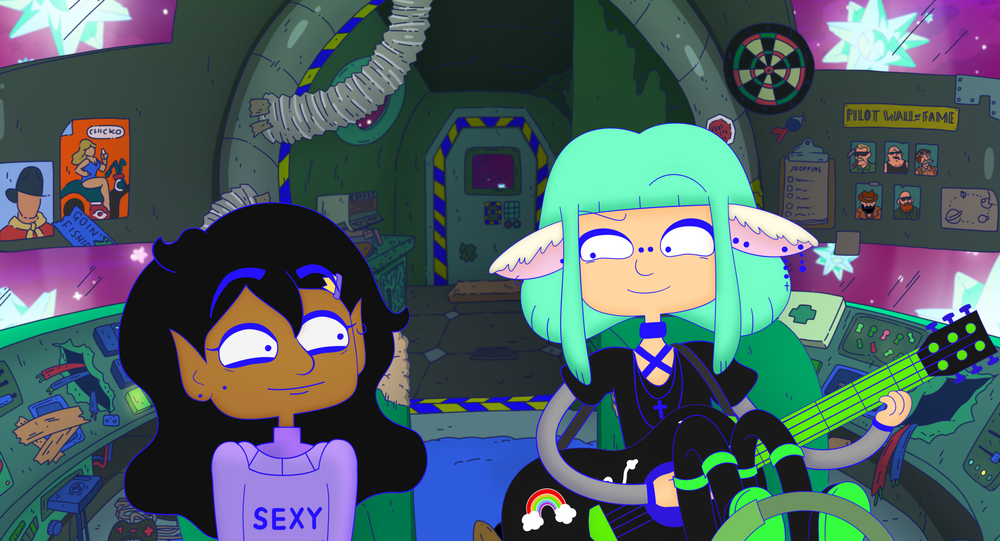There are some movie titles that instantly grab you. Lesbian Space Princess was one of those for me. Ever since I first heard about it, I’ve been eagerly waiting to watch it. And within the first five minutes, I could already tell it was going to be something special. Not just another quirky or “quirky but gay” indie animation, but something that felt genuinely joyful, deeply weird, and full of heart.
Easily my fave animated movie of the year—no question. It’s like if Adventure Time got bedazzled, kissed She-Ra on the mouth, and then blasted off into Galaxy Quest chaos. Totally unhinged, super heartfelt, and 100% queer in the cutest, most sparkly way. I’m obsessed.
Meet Princess Saira (voiced by Shabana Azeez), a delightfully awkward royal from the ultra-queer planet Clitopolis—where every month is Pride Month and glitter is basically a birthright. She’s the daughter of two queens (yes, literal lesbian queens named Anne and Leanne), but Saira’s not exactly vibing with the sparkle-saturated, high-achieving royal scene. While the rest of the kingdom is slaying at brunch and bedazzling everything in sight, Saira’s busy perfecting her close-up magic tricks—and earning the not-so-glamorous title of “most boring royal” from her own family.
When her ex, a tough and effortlessly cool bounty hunter named Kiki (Bernie Van Tiel), is kidnapped by a group of straight white “maliens” (a running gag that somehow doesn’t get old), Saira sets off on a rescue mission. Her team includes a sentient spaceship with major tech bro energy and a nonbinary goth pop star named Willow (Gemma Chua-Tran), who’s trying to break free from a toxic record label. What unfolds is a wildly chaotic space adventure that never lets go of its emotional core.
Visually and conceptually? Totally unhinged—in the best, most fabulous way. There’s a Royal Labrys (because of course), a full-on Lesbian Ball, and yes, a sentient vagina. Even the calendar is queer-coded. Every inch of the screen is bursting with wild little details you’ll want to pause and screenshot—like, did that just happen? It’s giving chaotic good energy, with worldbuilding made for the girls, the gays, and the terminally online.
But beyond the ridiculousness, the film is full of sincerity. The humor is absurd and self-aware, but never cynical. One minute you're laughing at a penis-shaped robot, and the next you're unexpectedly moved by Saira’s need to feel lovable. It’s a balancing act that shouldn’t work, but somehow it all clicks.
The emotional arc of the characters is what makes the story truly land. Saira’s need to prove her worth—particularly to an ex who maybe didn’t deserve her in the first place—will resonate with anyone who’s felt like the odd one out in queer spaces. Her journey becomes less about saving someone else and more about learning to choose herself.
And Willow might just be the quiet standout of the film. Their arc is tender and real: breaking out of performance mode and finding connection on their own terms. The dynamic between them and Saira is messy, funny, and unexpectedly touching. I’d gladly watch a whole spin-off of the two of them drifting through the galaxy, being weird and figuring life out.
The soundtrack adds another layer of richness to the story. While the film isn’t a musical, it makes room for short, expressive songs that feel like journal entries set to punk or dreamy indie. Some are playful, some are devastating, and a few—performed by the real-life queer punk band Stabbitha and the Knifey Wifeys—give the film a raw, authentic edge.
What I love most is how fully the film embraces its niche. It doesn’t try to be mainstream-friendly or smooth out the edges. It’s loud, queer, and proud of its own weirdness. And yet, it’s never exclusionary. Even if you’re not part of the LGBTQ+ community, there’s a warmth here that makes the film inviting. At its core, this is a story about self-worth, chosen family, and letting yourself be seen, flaws and all.
I wish this film had existed when I was younger—when I was unsure, self-conscious, and quietly desperate to feel like I belonged somewhere. Honestly, I’m glad it exists now. It’s funny, heartfelt, and deeply affirming without feeling like it’s trying to prove anything.
If you’ve ever felt like the awkward one in a room full of sparkly, confident queers—or like the sparkly one who’s still just trying to keep it together—this story will find you. Watch it. Watch it twice. Then text your weirdest, most wonderful friend and make them watch it too.
Directors: Emma Hough Hobbs, Leela Varghese
Voice Cast: Shabana Azeez, Bernie Van Tiel, Gemma Chuan-Tran
Writers: Emma Hough Hobbs, Leela Varghese
Producer: Tom Phillips
Cinematography: Claire Bishop
Editor: Ben Fernandez
Music: Michael Darren, Matthew Hadley

